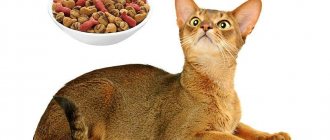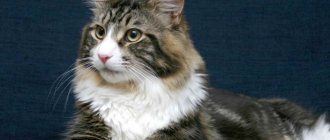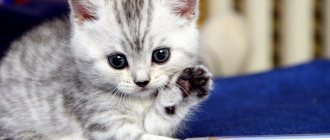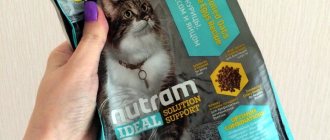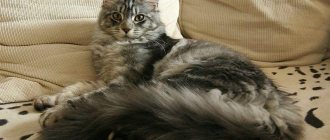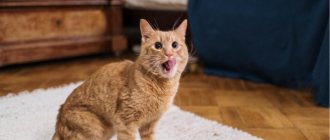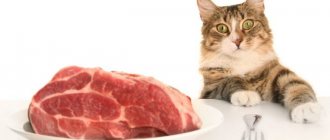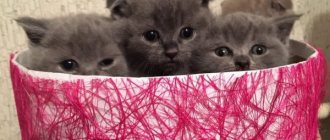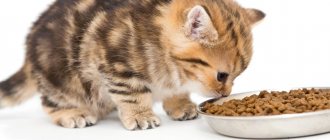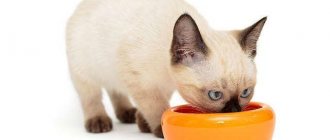Abyssinian owners love to talk about the history of the origin of their pet’s breed and its pickiness in nutrition. With the first point, everything is clear - the name is instantly associated with Egyptian sands, pyramids, sarcophagi and the mysterious rituals of the priests. Opinions often differ on the topic of nutrition. Adherents of a natural diet are opposed by fans of dry food. Amateurs are opposed by professional breeders who are interested in large volumes of products, affordable prices and high quality. It is difficult to understand such a kaleidoscope. Feeding an animal requires a systematic approach, so you need to understand how to properly feed an Abyssinian cat.
Choosing a place and dishes for feeding an Abyssinian cat
The life of a kitten of any breed in a new home begins with organizing a comfort zone for the pet. The Abyssinian chooses a convenient place for himself, and then it is the owner’s responsibility.
Poor food dishes can easily negate the benefits of an Abyssinian cat’s diet.
| Plastic bowls | The cheapest price category in a wide range of colors. Easy to clean, but difficult to wash off. They have a porous structure that retains microscopic feed residues. Experts believe that plastic appliances can cause the development of skin diseases. Sometimes cats don't like the smell coming from plastic. The best option for using such feeding bowls is to regularly replace old dishes with new ones. |
| Glass, porcelain, ceramics | Most often we are talking about ordinary saucers. They do not raise any claims to hygiene. The only negative is fragility. If the bowl of food for an Abyssinian cat is on a hill, the animal is able to throw it off and break it. |
| Metal utensils | Reliable, meets safety requirements. The structure of the material is non-porous, therefore it retains food residues. |
Additionally, a group of monoblock gadgets with automatic dosing of dry food and protection against overeating is considered. But they have not yet gained the trust of cat owners and therefore are not widely used.
All food utensils are available in two universal forms:
- Round, with sides of different heights. Abyssinian cats do not like deep bowls and try to pull food out of them onto the floor. The reason for this behavior is natural instinct and vibrissae (whiskers). The Abyssinians have quite long ones and during feeding they cling to the high sides of the bowl.
- Combined monoblock with two bowls. The form involves the organization of a single place for eating and drinking. If an Abyssinian cat pulls out food, this design is not suitable for the pet. Products fall into the liquid, and subsequently the water deteriorates.
To organize a feeding area, it is recommended to choose a place where the cat can sit comfortably and not get under the owner’s feet. When an animal carefully eats food, a very small space is needed. If the cat scatters food and likes to eat from the floor, the territory will have to be increased.
Important! The easiest way to assess the required space and understand which bowls are suitable for feeding an Abyssinian cat is through experimentation. You should offer your pet various options (a saucer, a round bowl or a combined block) and see which dishes he will eat the food from.
How much food to give an Abyssinian cat?
The amount and composition of food depends on the age, physical activity and specific condition of the animal (feeding kittens, pregnancy, growth, etc.). On average, an adult cat eats 200-300 g of wet and 50-75 g of dry food per day. Confined indoor cats require less energy (and therefore less food) than those that roam outside.
The Abyssinian cat gains its optimal weight by the age of one year. At this time, she needs to be weighed and her weight monitored in the future.
If you have spayed or neutered your pet, consult with your veterinarian to determine the right amount of calories per day and the optimal weight for your pet.
Remember that overweight Abyssinians have a very difficult time losing weight.
Natural diet for Abyssinian cats
Abyssinian cats are medium-sized animals, short-haired, active, and lead an active lifestyle. This is not a listing of external data, but an indication of the importance of quality feeding. Nutritional deficiency, which an ordinary fluffy cat can easily hide under a thick fur coat, will be clearly visible in a lean Abyssinian.
In the first place is a diet of natural products. The Abyssinian breed is a direct descendant of wild African and Asian cats, which are genetically predisposed to such a diet.
What foods are needed to feed a cat?
Balanced food for Abyssinian cats should contain the following food groups:
- Protein foods - cattle or poultry meat, offal, fish.
- Carbohydrates – porridges made from cereal plant species.
- Fiber and vitamins - found in vegetables, fruits, and herbs.
Additionally, the natural diet for an Abyssinian cat includes dairy and fermented milk products, eggs, vegetable oil, and yeast.
Rules and regulations for preparing natural food for feeding the Abyssinian cat
The following diet is recommended for adult cats of any breed (based on 1 meal):
| Product | Weight (g) | Periodicity |
| Beef meat (frozen raw) | The weight of protein ingredients per feeding does not exceed 120 g. For hyperactive animals, add 20 g of the product. | 3-4 times a week |
| Chicken or other types of poultry | Daily | |
| Poultry and beef by-products (heart, kidneys, stomachs, liver). | 2-3 times a week. Liver can be fed no more than once a week. | |
| Boiled sea fish | 60 g | Cats are given no more than 2 times a week. For cats – up to 1 time or less. |
| Whole milk or low-fat cottage cheese | 100 g 22 g | Daily. For gastrointestinal disorders, switch to fermented milk products. |
| Various vegetables | 50 g | Give with other food 3-5 times a week. |
| Cereals, pasta | 50 g | 3-5 times a week. |
| Egg (yolk) | 1 PC. | No more than 2 times a week. |
| Feed yeast | Products are calculated based on the weight of the animal (about 6 g) | 3-4 times a week. |
| Vegetable oil (mixed with feed) | 6 g | 3-4 times a week. |
The owner must also adhere to additional recommendations regarding feeding:
- If a cat willingly eats fresh herbs and fruits, you should not deprive her of this pleasure. Before use, products must be cleaned and scalded with boiling water.
- It is preferable to choose “noble” varieties of fish to feed your pet - salmon, trout, salmon.
- Fermented milk products can be given without any restrictions on the range, but alternate them and do not overfeed the animal. An Abyssinian cat can be fed cheese no more than once a week.
- It is allowed to feed honey (in small quantities).
- High-quality meat is fed raw, but it is first scalded and cut into small pieces.
- Sometimes you can feed your cat chicken neck. It should be passed through a meat grinder and added to the feed in small quantities.
Important! Feeding an Abyssinian cat with natural products is painstaking work. These animals are prone to overeating and weight gain. The owner needs to control portion sizes.
Features of the diet of Abyssinian cats
With proper care, an Abyssinian cat can live up to 10 years. And her nutrition is an integral part of the owner’s care. The diet for Abyssinians must be selected based on the age and health of the animal. In addition, it is important to take into account the physiological characteristics of the cat: is it sterilized, is it pregnant, does it have allergies, etc. Meticulous owners try to take into account the gender of the animal.
A cat's health and life expectancy depend on its nutrition.
Nutrition of Abyssinian cats depending on age
Proper nutrition should start from childhood. The natural option is for a cat to feed its cubs until they reach one year of age. However, Abyssinian kittens rarely stay with their mother for so long. A kitten should not be fed food intended for adult cats. And it's not just about the portion size. If the ideal nutrition for an Abyssinian kitten is milk, then artificial feeding should be based on this principle. At least until 10–13 weeks, the kitten needs special milk formulas. Gradually, the little Abyssinian can begin to be fed with baby meat mixtures and porridges. You can choose special pates for kittens.
Of course, it is also important to follow the regime. Little Abyssinians have stomachs the size of a thimble, so portions should be half the size of “adults.” You need to feed the baby several times a day (a month - 5 times, at 3 months - 4 times, at six months - 3 times, etc.). Most veterinarians recommend feeding Abyssinian kittens according to general rules.
The nutrition of adult Abyssinian cats differs more depending on the breed. A veterinarian I know told me that these cats have narrow jaws, so they often swallow food without chewing the food. Because of this, they often experience belching, hiccups and other gastrointestinal problems. Therefore, it is recommended to select feed or prepare food so that the food pieces are large. The cat will get used to the need to chew for a long time, and the problem with regurgitation will disappear.
Proper nutrition for kittens is the key to good health and growth
How to feed a cat and an Abyssinian cat
The gender of the Abyssinian cat in itself does not affect the diet. However, if we are talking about a male, then special attention is paid to the ratio of calcium and phosphorus in food. The fact is that cats are more often than cats prone to diseases of the genitourinary system (chronic renal failure, urolithiasis, etc.).
Diet for an obese Abyssinian cat
Abyssinian cats have a “sin” such as a tendency to overeat. This is partly due to the structure of the jaws and rapid swallowing. If the cat’s owner missed this moment, and the cat has already gained weight, then you need to reconsider its menu. You don’t have to reduce the portions, but you will have to fight with the caloric content (although sometimes the portions are reduced). It’s easier for owners of cats who eat ready-made food - they can change the food, on the recommendation of a veterinarian, to low-calorie food. And if the Abyssinian is fed natural food, then a new menu of dietary products will have to be developed.
Diet for an allergic cat
Everything is quite simple here. If an Abyssinian cat has an allergic reaction to any product, it simply needs to be excluded from the diet. You can only determine intolerance to a particular product based on fact.
Once upon a time I really wanted to have a cat of this particular breed. There was even a trip to the breeders. But at the nursery they told me that Abyssinians are prone to various types of allergies, including food ones. This cat's allergies may cause itching, she will start scratching herself until she bleeds, hard-to-heal sores will appear, etc. After weighing the pros and cons, I refused.
Selection of a nutrition plan during pregnancy and lactation
A pregnant Abyssinian, like any pregnant cat, needs a menu with increased nutritional value. Pregnant and lactating Abyssinians are fed up to 5 times a day, but in small, high-calorie portions. In addition, the diet should contain a large amount of vitamins and microelements.
Some veterinarians recommend feeding pregnant and lactating cats meat, even if they are fed commercial food. For future feeding, you need to include more fermented milk products in your diet. In some cases, a decoction of raspberry leaves (promotes favorable gestation) and scalded nettle leaves are recommended. True, not every cat will eat grass.
There are special foods for both pregnant and lactating cats that provide the correct balance of all necessary substances.
Diet of castrated and sterilized cats
Castrated/sterilized cats are at risk of developing diseases of the genitourinary system. To avoid this, you need to provide a diet with a minimum content of calcium, phosphorus and magnesium. It is recommended to completely exclude fish from the cat's menu. Some neutered Abyssinians change their eating behavior after castration. This happens especially often in cats that eat dry food. In such cases, you can change the food to wet food. In addition, the veterinarian can prescribe the necessary vitamins or sex hormones.
Many of my friends have neutered cats. After the operation, they become lazy, lose their playfulness, stop being interested in toys, etc. Because of this, they often gain excess weight. Therefore, veterinarians recommend a low-calorie diet for them. You can also reduce the volume of portions by increasing their multiplicity.
High-calorie food is recommended for pregnant and lactating Abyssinians, and low-calorie food is recommended for castrates and sterilized cats.
How to feed an Abyssinian cat: ready-made food in the diet
An alternative feeding option is providing meals with dry or wet nutritional formulas. They are produced by major global brands and contain the entire range of components necessary for the health and normal development of a cat of any breed.
Choosing industrial food for the Abyssinian breed
It is advisable to select food for an Abyssinian cat from the premium segment. It is important to consider not only the brand reputation of the brand, but also the type of food suitable for the animal.
- Dry industrial feed pellets should not be too large in size. The jaws of cats of this breed are not very wide and it is uncomfortable for them to bite through large pieces. In addition, there is a risk of damage to the roof of the mouth and gums.
- There are such compositions: regular, low-grain and grain-free. The first contains the dried nutritional components in full. The second and third types of food are distinguished by the complete absence or low amount of grains. This is explained by the fact that in the wild cats do not eat grains, which means they should not be in dry food.
- The third position is wet food. They contain canned products and can serve as an equivalent replacement for granular formulations. At the same time, they have an important advantage - one jar is designed for one-time feeding. This is how the issue of portion size for an Abyssinian cat is resolved.
The convenience of industrial feed is that the energy value and amount of vitamin supplements are indicated on the packaging. Thus, it is possible to control the caloric content and content of useful elements in the diet of Abyssinian cats.
Important! If the owner of an Abyssinian has chosen dry food as the main food, it is necessary to ensure that the food is always in a bowl. Then the cat will not eat enough for future use, for fear of being left without food.
What type of food is best for Abyssinian cats?
Foreign breeders recommend feeding Abyssinians with wet, dry and freeze-dried food. Many of them believe that constantly feeding one type of food can lead to health problems.
Each type of food has its pros and cons. For example, excessive consumption of wet food (canned food) can lead to stomach problems and diarrhea (diarrhea). Dry cat food is known for its high nutritional value as it has a good combination of carbohydrates and proteins. In addition, it does not spoil as quickly as canned food. Constant feeding of dry food can lead (especially if the cat drinks little water) to problems with the kidneys and urinary tract. In addition, non-premium and super premium dry food contains various grains that are difficult for Abyssinian cats to digest, which can cause allergies and inflammation of the gastrointestinal tract.
Mixed feeding
Combining natural and industrial cat food is not prohibited, but has a number of features. They relate to maintaining a balance of nutrients in the diet. As a rule, the owner gives the cat dry food on weekdays, and on weekends pampers it with something tasty and natural.
In this mode, it is difficult to keep track of the diet, so the menu often goes beyond acceptable limits.
When feeding a mixed diet, you need to monitor the physical condition of Abyssinian cats. If any indicators deteriorate, a combination of diets is excluded and one type of nutrition is left.
Algorithm for switching to a different diet for Abyssinian cats
The reason for changing the type of food or feed manufacturer may be the following factors:
- reaching puberty;
- pregnancy period;
- sterilization of cats and castration of cats;
- old age and decreased physical activity;
- veterinarian's prescription.
An additional reason is the desire of the owner himself to change the type of food for the cat.
It is not always possible to quickly change a cat's diet. An Abyssinian may not accept a new type of food or refuse it for a long time. Therefore, replacing cat food products must be divided into several stages:
- Gradually change familiar products to new ones. Felinologists do not recommend accelerating the transition period and suggest feeding 25-30% of new ingredients for the first week.
- In the next decade, the replacement of products will be increased daily by 10%. By the end of this period, the change in diet will smoothly complete.
- Do not mix natural and commercial wet food in the same bowl. This makes it difficult to monitor the body's reaction.
- When switching from natural or wet food, the granules need to be slightly soaked. The Abyssinian cat must get used to this type of food.
- The reverse process (switching from pellets to a natural diet) can be difficult. The products do not have an attractive smell, so the cat may initially refuse them. In this case, it is recommended to take a short fasting break (no more than 3 days), and then offer the Abyssinian a new diet.
A cat of any breed tries at least 3 types of food during its life. She gradually gets used to each of them, which makes it easier to change her diet in the future.
Important! Do not try to force feed your Abyssinian cat. This will for a long time perpetuate aversion to products that are “imposed” against desire.
Vitamins and mineral supplements to food in the diet of Abyssinian cats
The composition and volume of vitamins, minerals and trace elements must be selected individually, taking into account the age, size and health status of the Abyssinian cat. Standard food necessarily contains potassium, calcium and magnesium, yeast, Omega-3 polyunsaturated fatty acids and an arbitrary combination of vitamins. This is enough to maintain normal pet health.
If difficulties arise with the bones and muscles, skin and coat, immunity or gastrointestinal tract, it is recommended to seek veterinary help. The doctor will prescribe additional vitamin support for the cat or prescribe a separate medicinal food that contains the necessary nutritional supplements.
Vitamins and supplements
High-quality industrial feeds contain a basic complex of vitamins, so additional sources are not required. With natural feeding, vitamins and supplements must be introduced into the cat’s diet on an ongoing basis.
Natural vitamin supplements:
- Meat and bone meal.
- Fish, chicken, beef liver.
- Greens, vegetables, fruits.
- Sunflower oil, olive oil.
- Brewer's yeast.
Pharmacy vitamin products:
- Fish fat.
- Feed tricalcium phosphate.
- Omega-3, Omega-6.
- B vitamins.
In addition to vitamins and minerals, a cat needs taurine for its normal functioning. Unlike dogs, cats can only get taurine from food. The richest sources of taurine are:
- Turkey.
- Rabbit.
- Chicken heart, liver.
- Beef heart.
- Pork, ham, trimmed of fat, after deep freezing.
- Pork liver, heat-treated.
- Ocean fish, shellfish.
- Raw red fish.
- Homemade live yogurt.
- Whole milk.
For your own convenience, you can switch your pet to industrial vitamin complexes. Typically, vitamin supplements are sold in tablet or powder form. The tablets contain natural flavors, so most cats enjoy eating them.
Water in a cat's diet
Fluid intake depends on the type of food and daily food intake.
- Natural food and wet food contain a sufficient concentration of moisture and are its source for the animal’s body.
- Dry granules require more careful attention to the presence of water in the drinking bowl - the cat will need a large amount of liquid.
Regardless of the diet chosen, water should always be available. On average, a cat drinks 40-50 ml of liquid per kilogram of weight per day, but this is a very approximate level.
A clear indicator of a lack of water is the appearance of the coat and trips to the toilet. Shiny, evenly lying hair and 2-4 urinations per day indicate a normal amount of fluid in the diet of a healthy cat.
Sample menu by age
By drawing up an approximate menu by age, you will be able to sensibly assess your capabilities, both physical and financial. When leaning towards natural feeding, it is important to take into account the time required. Ready-made feeds involve significant financial investments.
When planning to get a kitten, it is important to remember that it is not advisable to change its type of diet until it is one year old. When you buy a kitten from a nursery or a breeder, it is important to clarify what type of food the animal is accustomed to. The diet can be changed after the adaptation period if the breeder’s choice does not suit you.
Note! A valid reason for a sudden change in diet is feeding with economy class products or an unbalanced natural diet.
Up to a month
Until the age of one month, kittens should feed exclusively on mother's milk. Under circumstances that do not allow natural feeding, the kitten is transferred to a cat's milk replacer.
Natural menu:
- Goat milk diluted with boiled water.
- Scott's kitten mix.
- Tiling mix for kittens.
Industrial menu:
- Cat milk replacer.
- From 1.5–2 weeks – infant formula “from 0” (without additives and sugar).
The daily food intake for an Abyssinian kitten under the age of one month ranges from 30 to 50 ml, depending on the number of babies in the litter, individual characteristics and dimensions. Number of feedings for an Abyssinian kitten under one month of age:
- From birth to 2 weeks, feeding every 2 hours – 10 times a day.
- From 2 to 4 weeks, feeding every 2–3 hours – 8 times a day.
Features of feeding and diet of Abyssinian kittens
Nutrition in the first months of life leaves an imprint on the entire subsequent period. Under normal conditions, there is no question of feeding Abyssinian kittens immediately after their birth. They receive mother's milk, and with it immunity and natural strength.
In exceptional cases, babies are transferred to artificial feeding.
Up to a month
An orphaned kitten has a good chance of growing up healthy and strong. The absence of maternal feeding is replaced by:
- diluted goat or cow milk;
- surrogate cat milk;
- special mixtures for this age.
An Abyssinian kitten has to be fed every 2-2.5 hours. Due to active metabolism (metabolism), he experiences a constant need for food and needs regular feeding for up to 1.5 months (including at night).
1 month
During the first 30 days, the kitten’s weight increases 4-10 times: females - 300-600 g, seals - 400-800 g. Under natural conditions, this period is characterized by leaving the mother’s nest and a smooth transition to artificial food.
The diet is gradually expanding to include:
- whole cow or goat milk;
- beef broth;
- boiled minced meat or pureed homemade pate, diluted with water or low-fat broth.
It is important to monitor the amount of food to prevent overeating and regurgitation of leftover food.
2 months (girls weigh 550-980, boys - 0.95-1.5 kg)
Fermented milk products (ryazhenka, yogurt) and raw meat are added to the milk and broth with minced meat. The kitten should be able to handle this food easily and not spit it out. Therefore, before giving an Abyssinian cat natural meat food, it is cut into small pieces.
3 months (girls – 1-1.8 kg, boys – 1.4-2.6 kg)
At this age, mandatory vaccination is carried out, due to which the feeding of the Abyssinian cat may fail with a decrease in appetite. There is no need to be upset about this - the animal will suffer a little stress and return to its normal diet.
Starting from 3 months, a chicken egg yolk is added to the Abyssinian kitten’s diet. It is given separately or mixed with other products. You can replace it with a whole quail egg (raw). Also fed with grated carrots and green apple (puree).
4-6 months (cats – up to 3.6 kg, males – up to 4.5 kg)
By six months, the Abyssinian cat gets used to the food and is fully socialized. At this age, she had already changed her house and settled in a new place.
The diet is approaching a full set of ingredients: meat, fish, offal, vegetables and fruits.
Industrial feed is given in accordance with the manufacturer's recommendations, and dry granules are additionally softened with water.
From 6 months to 1 year
During this period, the young Abyssinian undergoes a complete change of teeth, because of which it is not recommended to keep him on dry food - it is better to give preference to wet, semi-moist products.
Important! By the age of one year, the number of feedings gradually decreases to 2-3 times a day and to the established food norm (0.12-0.15 kg).
Features of feeding
The Abyssinian cat is a medium-sized animal, with a compact body and well-developed muscles. She is very active, so nutrition must meet a number of requirements for the proper development and formation of the body. Each age has its own needs, and health and proper appearance are laid down from the first days of the baby’s birth.
Kitten food
Abyssinian kittens grow slowly, so they are weaned from their mother at a later age - at 7-9 weeks. The later the baby switches to completely solid food, the more time his body will have to form a stable immune barrier.
Kittens that have been weaned from their mother need high-energy food - 200-250 kcal per kilogram of body weight or 837-1.046 kJ/kg. The stomach volume of an Abyssinian baby is small, so high-energy nutrition covers the energy costs of a small amount of food.
An adult animal weighs from 3 to 7 kg. Has a compact, muscular body. To form muscle mass, the Abyssinian needs food with a high protein content, but since the baby’s enzyme system is not yet perfect, its digestibility should be at least 85%, and dry matter – 80%.
In order for the skeleton and teeth to be strong, you need foods high in fluoride and calcium. For better absorption of these substances necessary for the mineralization of bone tissue, vitamin D and K2 are needed. They will help the minerals get where they need to go rather than being deposited as kidney and gallstones. They are available in sufficient quantities in products, but small kittens are given them separately, but in strictly dosing quantities. Excess vitamin D can lead to vascular sclerosis.
Ready-made food for kittens contains all the necessary nutrients for kittens. But those who decide to feed their Abyssinian natural food should think about vitamin and mineral supplements. Veterinarians advise:
- Gimpet Baby Tabs – with vitamins A, E, D3, K3 and B, taurine, for good vision, L-carnitine for active kittens;
- Canina Cat Mineral Tabs – properly balanced calcium/phosphorus composition, brewer’s yeast for good digestion, seaweed to replenish the body with iodine;
- Beaphar Kitty's Junior – fortified treats for babies from 6 weeks of age.
Abyssinians are not prone to overeating, but it is worth considering the baby’s age when creating a feeding schedule:
- up to 6 months – kittens are fed 4-6 times;
- from 6 to 8 months. – the number of meals is reduced to 3 times;
- from 8 months – the kitten is transferred to an adult diet and given food 2 times a day.
When choosing between dry and natural food, breeders give preference to ready-made food. Dry granules perfectly massage the gums and clean the teeth. This is very important for Abyssinians, as they are prone to dental diseases and tartar deposits. But it should be taken into account that Abyssinians have narrow jaws, so dry food for Siamese kittens is suitable for them.
Adult cats
The diet of an adult Abyssinian cat should include:
- Proteins : lean veal, chicken, turkey, beef and chicken by-products, sea fish (white), poultry egg yolks, medium-fat fermented milk products - yogurt (natural, without additives), kefir, yogurt, fermented baked milk, non-acidic cottage cheese, sour cream or cream .
- Carbohydrates – cereal porridges.
- Vitamins, fiber - vegetables and fruits.
Beef or veal is pre-frozen for 3 days in the freezer. You can also pour boiling water over it if the owner is sure that it is fresh. It needs to be cut into pieces convenient for eating. The meat may have veins so that the cat can clean its teeth. It must be given to the cat daily.
Beef and chicken by-products are prepared in the same way as meat - by freezing them. But in order to avoid infection with helminths, they can be boiled. Heart, lungs and kidneys are introduced into the diet no more than 2-3 times a week. Abyssinians are very fond of liver. This food preference evolved in wild cats and is inherited by their domestic offspring, but liver should not be given too often as it can cause diarrhea.
Fish is a source of omega fatty acids and phosphorus for cats. However, feeding fish too frequently can cause gallstones, especially in spayed/neutered Abyssinians. Therefore, 1 fish day per week is enough.
Boiled egg yolks and natural quail eggs are added to vegetables and cereals. You shouldn't get carried away with them either. Having received eggs 1-2 times a week, the cat will provide the body with the necessary amino acids and fats in sufficient quantities.
Fermented milk products – 3-4 times a week. They restore intestinal microflora, stimulate peristalsis and the synthesis of digestive enzymes. Porridge - cooked in water, weak meat or vegetable broth. They are mixed with boiled fish, meat or vegetables and given several times a week.
Abyssinians enjoy eating vegetables, herbs, and fruits. They can be given boiled or raw, grated on a fine grater. Boiled fish and meat are also added to them, in the proportion of 1 part vegetables or cereals and 2 parts meat or fish.
For good intestinal function and cleaning it from hairballs, the cat is given sprouted grains of wheat and oats, as well as specially grown grass. You should not encourage your pet to eat grass on roadsides and in parks. It may be treated with fertilizers, herbicides or contain heavy metal salts.
To make the cat's luxurious coat shine, brewer's yeast or special vitamin supplements are added to her food 3-4 times a week. Cooked food should be warm and fresh. It is best to cook it immediately before serving, but if you have to prepare it for future use, the portions are packaged separately and placed in the freezer. Before serving, they are defrosted and slightly warmed up.
Ready-made food for Abyssinians should be selected from the “premium” or “super-premium” category. This could be food:
- SIAMESE ADULT Royal Canin;
- Royal Canin Siamese Adult;
- Royal Canin Siamese adult.
The kibble size is ideal for breeds with narrow jaws such as Siamese and Abyssinians.
Dry food should be available at all times. Then the cat will not try to eat “in reserve.” Clean fresh water should also be available at all times. But breeders recommend placing a bowl of liquid away from the feeder. This is how the ancestors of the Abyssinians got used to it in the wild.
Feeding cats during pregnancy
During such a crucial period, the Abyssinian needs a completely different diet. It is very close in composition to a kitten’s diet, since:
- Calcium and fluorine are necessary for the formation of the fetal skeleton. If there is insufficient intake of it into the body, the element is washed out of the cat’s bones;
- the lack of certain amino acids, vitamins and microelements leads to disruption of the formation of organs and systems;
- Insufficient intake of amino acids into the body can cause fetal death or miscarriage.
Therefore, it is very important for a pregnant cat to have the following vitamin groups in its diet:
- A – so that calcium and phosphorus are deposited specifically in the bone tissue of the fetus;
- B6, B12 – activate the production of collagen fibers in the base of muscles, joints and skin;
- E – helps restore tissues of the nervous system.
Food should contain phosphorus, calcium, iron, zinc. During pregnancy, you need 1.5-2 times more of them. A lack of taurine leads to eclampsia, miscarriage, miscarriage or pathology in newborn kittens.
Linoleic and arachidonic fatty acids are necessary for the formation of the neural tube of the fetus. Their deficiency leads to infertility. Protein is important both during the period of gestation of kittens and for the synthesis of milk.
The number of feedings and serving size are calculated depending on the duration of pregnancy:
- First trimester – increased nutrition is required for the formation of embryos. The serving volume is increased by 10% and the daily volume of food is divided into 4-5 times;
- II trimester - the portion is increased to 50%, but overfeeding is avoided;
- III trimester – the growing uterus puts pressure on the stomach, so the daily requirement is maintained, but given in smaller portions, divided into 6 times.
In order not to cause food stress or allergies, it is worth maintaining the type of food that the Abyssinian was accustomed to before pregnancy. The easiest way is for the cat to eat ready-made food. But it’s worth choosing the appropriate one from the line for pregnant cats of the company she’s used to. The best foods are:
- Nature's Protection Kitten;
- Now Fresh Kitten Grain Free Recipe;
- Acana Wild Prairie cat 37/20;
- MOTHER AND BABYCAT, Royal Canin;
- Josera Minette.
In addition to dry food, the Abyssinian can be offered wet food and canned food from Royal Canin:
- PEDIATRIC WEANING;
- Babycat Instinctive;
- Kitten Instinctive;
- Kitten Sterilized.
Canned food, pates, pieces in jelly are produced by Purina, Gurmet Gold and others. Dry and wet food can be mixed. For example, the diet uses 75% dry and 25% canned. The amount is calculated based on the daily norm.
The Abyssinian cat is in good health, but with age she may develop problems with appetite, peristalsis and bowel movements.
Feeding sick and elderly cats
Abyssinians can develop diseases, so during this period they require special nutrition:
- For cats with metabolic problems, Hill's Prescription Diet Metabolic and Purina Veterinary Diets OM are used.
- For impaired renal function - Hill's k/d, Royal Canin Urinary S/O LP34, Purina Veterinary Diets UR, Purina Veterinary Diets NF, Urinary Feline dry.
- For cats with allergies, Hill's z/d is suitable, and for cats with gastrointestinal diseases and sensitive stomachs - Hill's i/d, Hill's w/d.
- To avoid constipation, add a little vegetable oil to natural foods or use Royal Canin Fiber Response food.
You should not experiment on your own with the choice of food for this category of Abyssinian cats. The right type should be recommended by a veterinarian, taking into account the individual characteristics of the animal.
Diet of an older cat
As an animal ages, its diet changes significantly. Before deciding on food for an aged Abyssinian cat, it is necessary to assess its health - the condition of its teeth, coat and musculoskeletal group.
At this age, animals are most often fed wet food (natural or industrial) with the addition of mineral and vitamin components. Castrated and sterilized individuals are prone to weight gain, so the food norm in these groups is strictly observed.
Extra pounds have a bad effect on the cardiovascular system and shorten the life of an Abyssinian.
Ready diet
With a ready-made diet, Abyssinian kittens are fed wet, dry, semi-moist industrial food, canned food, and high-quality pates. The prepared diet should be varied. You should not feed your pet only, for example, dry food or wet food. Combine dry pads with canned food, pates, and treats for kittens.
Advantages of ready-made diets:
- no need to waste time preparing a varied menu for the cat;
- the brand line includes food for kittens of various age groups;
- dry food has a long shelf life;
- the manufacturer indicates the approximate daily allowance by age on the packaging;
- large selection of flavors.
The line of well-known brands also includes products for weakened animals, for kittens with a sensitive gastrointestinal tract, and pets prone to food allergies.
The best food for Abyssinian kittens:
- Royal Canin.
- Hill's.
- ORIGIN.
- Acana.
- Nutra Gold.
High-quality feed has a balanced composition and contains all the necessary nutrients, vitamins, microelements, and amino acids. Holistics are intended for nutrition of Abyssinian kittens with sensitive digestion. Contains probiotics and enriched with B vitamins.
Prohibited foods
The following foods should not be included in the diet of Abyssinian cats:
- pork in any form;
- egg white;
- fats, skin, bones of birds;
- sweet fruits with a high juice content;
- dried, smoked fish and all types of freshwater fish in raw form;
- sugar-containing products and sugar substitutes, caffeine and stimulants;
- baked goods in any form;
- mushrooms.
The main rule is that you cannot feed your Abyssinian cat anything potentially dangerous. Mushrooms cause allergies, chicken skin with a fatty layer leads to weight gain, and raw fish is a breeding ground for worms.
What should you not feed an Abyssinian kitten?
Like any other cat, food from the human table is contraindicated for the Abyssinian - sausage and various meat delicacies, as well as mature cheeses contain too much fat, salt and spices, and flour and sweets contain carbohydrates. Meat fried or cooked with various sauces and all types of soups are also not only not healthy for cats, but can also cause serious health problems. Such dishes often contain onions and garlic, which are poisonous to cats because they contain n-propyl disulfides, substances that destroy red blood cells in the animal's blood.
Among vegetables and fruits, tomatoes, eggplants, grapes and raisins are also contraindicated for cats, but boiled potatoes, which some pets love, are harmless, but in large quantities they can cause digestive upset, and in addition, they contain too many starchy carbohydrates.
You should not give cats chocolate or any other caffeine-containing products. Melixanthin substances, which are included in their composition, can cause vomiting, digestive upset and heart rhythm disturbances, even death.
Ethanol entering a cat’s body also leads to sad consequences. Since the diet of carnivores has never included ripe fruits and vegetables, their bodies do not produce the enzyme alcohol dehydrogenase, which breaks down ethanol into relatively safe compounds, as, for example, occurs in humans, some other primates and omnivores. It is clear that no normal person would give alcohol to a kitten, but it is necessary to remember about its complete intolerance in cats, since on the Internet you can find “folk advice” on how to treat, for example, digestive disorders in cats with alcohol-containing tinctures of various herbs.
